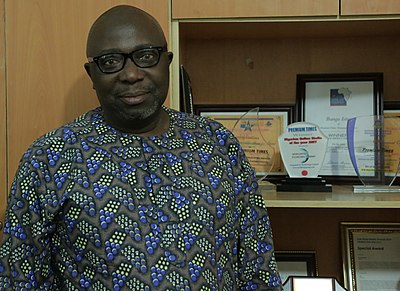The National Union of Campus Journalists, (NUCJ) in collaboration with Help Foundation for students hosted the Publisher of Premium Times, Mr. Dapo Olorunyomi popularly known as Dapsy to discuss the theme: “Resilient Campus Journalism: Key Element in Education Reform.”
The webinar was held on NUCJ Twitter handle on the 2nd of May, 2021 by 6:00 pm to commemorate the World Press Freedom Day 2021.
Olorunyomi is the co-founder, CEO, and publisher of the Nigerian newspaper @PremiumTimesng which today is one of the most trusted newspapers in Nigeria and a standard for African investigative journalism. He has dedicated his life to holding the powerful to account, is a fierce advocate for press freedom, and is referred to by some as the “godfather” of online journalism in Nigeria.
Excerpts of the Tweet Chat compiled by Abdulrasheed Hammad and Abdulwaheed Sofiullahi are as follows:
NUCJ: What is your philosophy about Press Freedom?
Dapsy: “First and foremost that journalism serves to promote and defend core democratic values. It must serve as a people’s tribune against arbitrary power. It must give concrete consequences to the accountability of governing processes – political, cultural, economic.
NUCJ: There is no press freedom on Nigeria’s campuses,” is this claim correct and why should it be important?
Dapsy: Campuses are microsets of the larger Nigerian community. By all parameters, press freedom is deteriorating in Nigeria as a whole. That answers the question by half, however. The challenge, always, is to struggle to extend the context and boundaries of freedom. If we want to fully entrench press freedom on our campuses, we must understand the ramification of the concept itself.
There are four key components: [a] the legislative context created by campus regulations, [b] the independence offered through training, ethics, [c] the pluralism offered by the diversity of content and actors like the gender inclusivity of campus journos and [d] the safety of campus journos. To entrench the regime of press freedom on campuses we need to build these four pillars concretely.
Our campuses incubate leaders of our country. So, inculcating traditions of freedom as part of their emergence is a multiplier force for the kind of society we want to build in the future.
NUCJ: Do you have any hope in the Student Bill of Rights to protect campus journalists?
Dapsy: I have not seen or studied the bill. I look forward to seeing it. However, it can be a potent force of change if managed with skill, and an inclusive constituency of campus actors built to sell it. It can make a difference to traditions of freedom across the board.
NUCJ: I’m almost certain many students will love to see the full implementation of this Bill, which I believe will serve as a tool in ensuring their safety and press freedom.
NUCJ: On a final note, our goal is to call public attention to the erosion of press freedom on Nigeria’s campuses, are we paranoid? What can be done? Your suggestions sir.
“No, you are not. Campuses need to be freed. Backstory: Dec 1982 @ 3rd Annual conference of NANS, we passed an idealistic Charter of Demands to democratize education in Nigeria. It became the basis of many educational reforms of the 90s. Let’s go back to history and build back better!
Gbolagade Sunday: How can we ascertain press freedom when the financial capability of such institution’s editorial board lies in the hand of the Management and Students’ Union in that school?
Dapsy: True, a financially disabled press can hardly be functional, independent, pluralistic, or even safe. However, this is a call-up to creativity. We need new strategies on how to finance campus in the new age.
I sense that the current exco has reinvigorated the NUCJ to a new active tempo. What needs to be added are fresh strategies on how to finance our activities. That is the next gap to be filled.
#WPFD2021


Change that “Help Foundation” to NUCJ. It was NUCJ that made the statement.
Done. Thanks